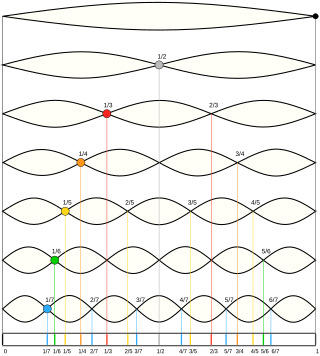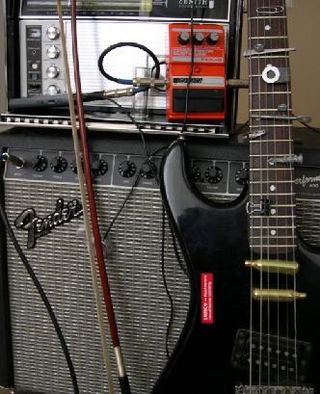Related Research Articles

In physics, acoustics, and telecommunications, a harmonic is a sinusoidal wave with a frequency that is a positive integer multiple of the fundamental frequency of a periodic signal. The fundamental frequency is also called the 1st harmonic; the other harmonics are known as higher harmonics. As all harmonics are periodic at the fundamental frequency, the sum of harmonics is also periodic at that frequency. The set of harmonics forms a harmonic series.

Orchestration is the study or practice of writing music for an orchestra or of adapting music composed for another medium for an orchestra. Also called "instrumentation", orchestration is the assignment of different instruments to play the different parts of a musical work. For example, a work for solo piano could be adapted and orchestrated so that an orchestra could perform the piece, or a concert band piece could be orchestrated for a symphony orchestra.

La Monte Thornton Young is an American composer, musician, and performance artist recognized as one of the first American minimalist composers and a central figure in Fluxus and post-war avant-garde music. He is best known for his exploration of sustained tones, beginning with his 1958 composition Trio for Strings. His compositions have called into question the nature and definition of music, most prominently in the text scores of his Compositions 1960. While few of his recordings remain in print, his work has inspired prominent musicians across various genres, including avant-garde, rock, and ambient music.

Cornelius Cardew was an English experimental music composer, and founder of the Scratch Orchestra, an experimental performing ensemble. He later rejected experimental music, explaining why he had "discontinued composing in an avantgarde idiom" in his own programme notes to his Piano Album 1973.

Sofia Asgatovna Gubaidulina is a Soviet-Russian composer and an established international figure. Major orchestras around the world have commissioned and performed her works. She is considered one of the foremost Russian composers of the second half of the 20th century.

In music, extended technique is unconventional, unorthodox, or non-traditional methods of singing or of playing musical instruments employed to obtain unusual sounds or timbres.
Frances-Marie Uitti is an American cellist and composer known for her use of extended techniques and performance of contemporary classical music. Tom Service, music critic for the Guardian newspaper, has called her "arguably the world's most influentially experimental cellist."
In music, variation is a formal technique where material is repeated in an altered form. The changes may involve melody, rhythm, harmony, counterpoint, timbre, orchestration or any combination of these.

A prepared guitar is a guitar that has had its timbre altered by placing various objects on or between the instrument's strings, including other extended techniques. This practice is sometimes called tabletop guitar, because many prepared guitarists do not hold the instrument in the usual manner, but instead place the guitar on a table to manipulate it.
Howard While Skempton is an English composer, pianist, and accordionist.

John Tilbury is a British pianist. He is considered one of the foremost interpreters of Morton Feldman's music, and since 1980 has been a member of the free improvisation group AMM.

An experimental musical instrument is a musical instrument that modifies or extends an existing instrument or class of instruments, or defines or creates a new class of instrument. Some are created through simple modifications, such as cracked cymbals or metal objects inserted between piano strings in a prepared piano. Some experimental instruments are created from household items like a homemade mute for brass instruments such as bathtub plugs. Other experimental instruments are created from electronic spare parts, or by mixing acoustic instruments with electric components.
Michael Blake is a South African contemporary classical music composer and performer. He studied in Johannesburg in the 1970s and was associated with conceptual art and the emergence of an indigenous experimental music aesthetic. In 1976 he embarked on 'African Journal', a series of pieces for Western instruments that drew on his studies of traditional African music and aesthetics, which continued to expand during two decades in London until he returned to South Africa in 1998. From around 2000 African music becomes less explicit on the surface of his compositions, but elements of rhythm and repetition remain as part of a more postcolonial engagement with material and form. He works in a range of styles including minimalism and collage, and now also forages for source material from the entire musical canon.
Tania Chen is a mixed media artist and interdisciplinary pianist who composes experimental, improvised and contemporary music. She plays for a global audience, but is mostly based in New York, San Francisco, and London. She is known for performing the works of composers such as Cornelius Cardew, Michael Parsons, John Cage, Earle Brown, Morton Feldman and Chris Newman. Composers of the younger generation she has worked with include John Lely, Li-Chuan Chong and James Saunders.
Rhodri Davies is a harp player working within the field of free improvisation. He was one of the most prominent members of the London reductionist school of improvised music that was active in the late 1990s and early 2000s and which has been described as being "extremely influential over the last decade".
James Saunders is a British composer and performer of experimental music. He is Professor of Music and Head of the Centre for Musical Research at Bath Spa University.
Anton Lukoszevieze is a British-Lithuanian cellist, composer and visual artist. He is the director of the ensemble Apartment House, who are known for their advocacy of experimental and avant-garde music and frequent international performances. He is an alumnus of the Royal College of Music.
Tim Parkinson is a British experimental composer, pianist and curator. His music has been commissioned and performed by ensembles including Apartment House, the Basel Sinfonietta and the London Sinfonietta, and soloists including Anton Lukoszevieze and Rhodri Davies. It has been broadcast on BBC Radio 3, Resonance FM, WDR3 (Germany), and Radio SRF 2 Kultur (Switzerland). He is co-curator of the concert series Music We'd Like to Hear, which has run since 2005, having previously organised concerts at the British Music Information Centre in London from 1997 onwards.
Angharad Davies is a Welsh violinist and composer, known for her work in the field of free improvisation, her use of prepared violin, her extensive discography and collaborative work with other musicians.
Martin Arnold is a Canadian composer of experimental music. His music has been widely performed and commissioned by ensembles including the BBC Scottish Symphony Orchestra, Quatuor Bozzini, the pianist Eve Egoyan, the violinist Mira Benjamin and the cellist Anton Lukoszievieze.
References
- 1 2 Whitehouse, Richard. "LELY The Harmonics of Real Strings". Gramophone. Retrieved 2 May 2019.
- 1 2 "Word Event: a verbal notation symposium | Bath Spa University: Performance". Word Event. 10 May 2011. Retrieved 2 May 2019– via WordPress.
- ↑ "Current Curators". Music We'd Like to Hear. Retrieved 2 May 2019.
- Wigglesworth, Sam (23 July 2013). "Music We'd Like to Hear with Anton Lukoszevieze and Tim Parkinson". Bachtrack. Retrieved 17 January 2024. - ↑ Dbarbiero (11 June 2012). "AMN Reviews: John Lely and James Saunders – Word Events". Avant Music News. Retrieved 2 May 2019.
- ↑ "Prospectus 2019/20" (PDF). Trinity Laban Conservatoire of Music and Dance. p. 73. Retrieved 2 May 2019.
- ↑ Parkinson, Tim. "A Clear Apparence". Wandelweiser. Retrieved 17 January 2024.
- 1 2 Hammond, Matthew (July 2015). "John Lely: The Harmonics of Real Strings . Anton Lukoszevieze (vc). Another Timbre at80". Tempo. 69 (273): 48–49. doi:10.1017/S0040298215000212. ISSN 0040-2982. S2CID 147940985.
- ↑ Eyles, John (15 January 2015). "John Lely: The Harmonics of Real Strings". All About Jazz. Retrieved 17 January 2024.
- ↑ Clark, Philip (11 March 2015). "The playlist: experimental music – Africa Express, Colin Webster, Rutger Zuydervelt, Laurie Spiegel and more". The Guardian. ISSN 0261-3077 . Retrieved 17 January 2024.
- ↑ Saunders, James (2009). The Ashgate research companion to experimental music. Farnham, England: Ashgate. p. 96. ISBN 9780754662822. OCLC 311310354.
- ↑ "Releases". John Lely. Retrieved 17 January 2024.